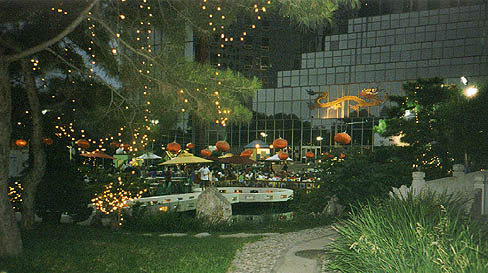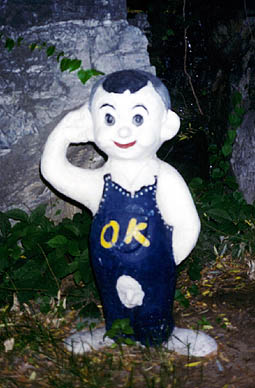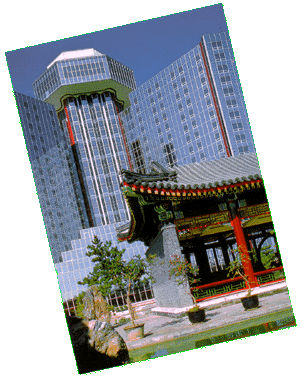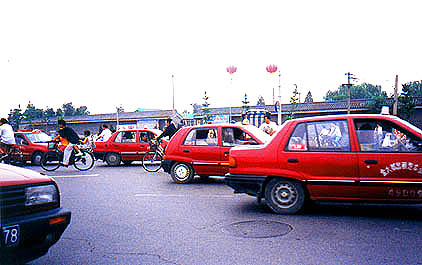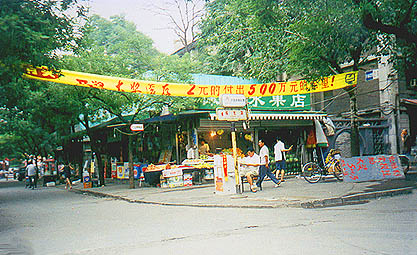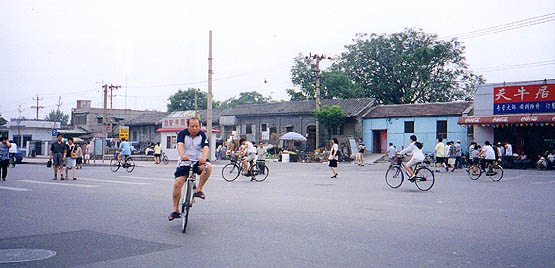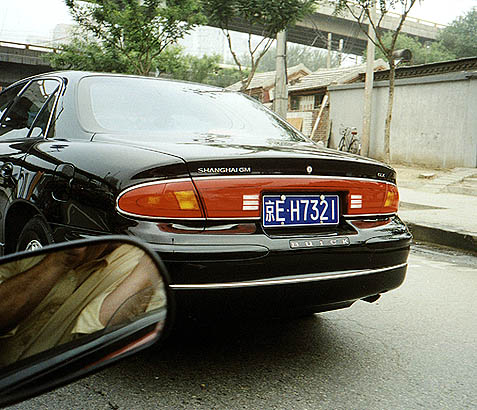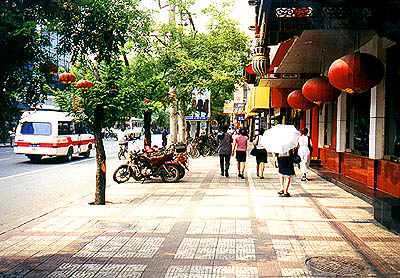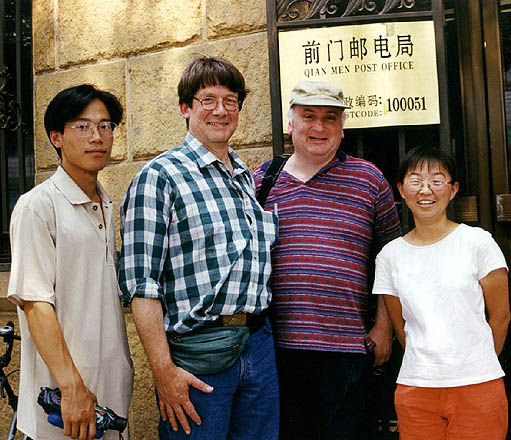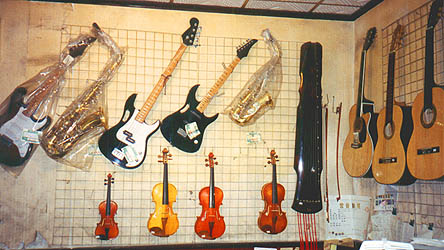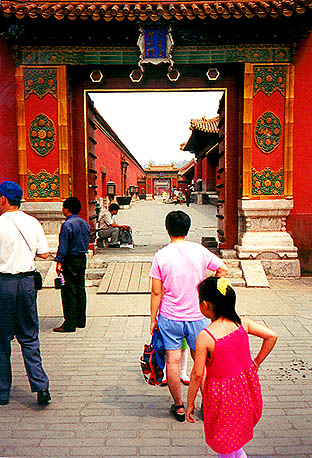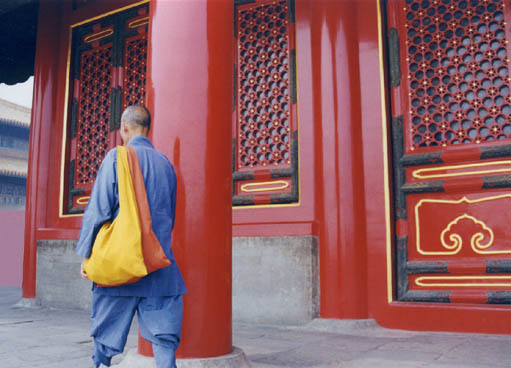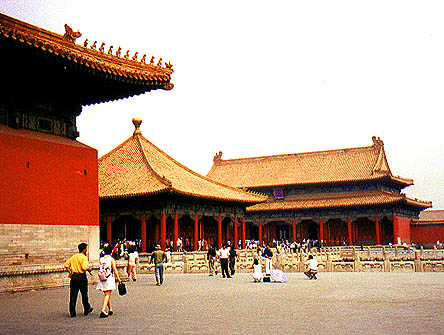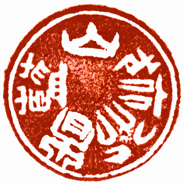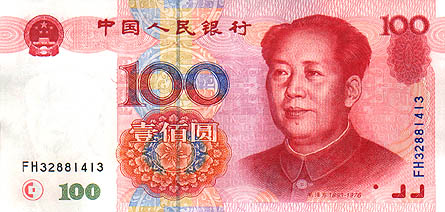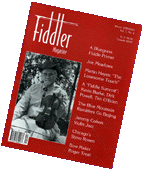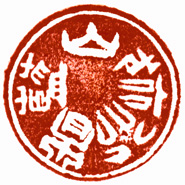 "Oh! So you're going there for a cultural exchange?" Well, not exactly, but in its own way, that's just what happened. An agricultural trade fair takes place in Beijing every year, and the United States Department of Agriculture represents the US as one of about thirty nations at the fair. Their thrust at the 2000 fair was to promote the marketing of US food products to the dala, the burgeoning Chinese middle class. There is a large outdoor garden by the Great Wall Sheraton in Beijing, just down the road from the expo site itself, and every evening for nine days last June, the USDA sponsored a Great American Barbecue there, offering a lavish buffet of all kinds of American-style foods, including such items as corn-fed beef, Alaska salmon and crab, corn on the cob, taters in aluminum foil, California wine, fresh citrus fruit, even individually wrapped dried prunes. Truly, what American barbecue would be complete without individually wrapped dried prunes, pits still in? We three—Jody Stecher singing and playing mandolin and fiddle, Heath Curdts on vocals and banjo, and myself on vocals and guitar—were brought in to provide ‘authentic music’ for this event. While the throng munched, we played. At the USDA's main office in the Embassy compound in Beijing, there presides a woman named Suzanne Hale. Suzanne has spent many years in Japan and China, and is as well a big fan of bluegrass music, particularly the Dry Branch Fire Squad, and knew their banjoist, Bill Evans, from her sojourns on US soil. In 1999, she intended to have him come to do his marvelous one-man banjo show at an event in Beijing. Alas, in May, NATO forces (a U.S. B-2 bomber, to be precise) bombed the Chinese Embassy in Belgrade, Yugoslavia, so Bill was advised not to go in 1999. He was, however, invited back for 2000, but being booked by then for a banjo camp, Bill passed the gig on to Jody, who in turn called me and old-time banjo whiz Heath Curdts. Not quite bluegrass anymore, but at the last minute, we had a trio poised to represent rural American culture musically in China's capital city. 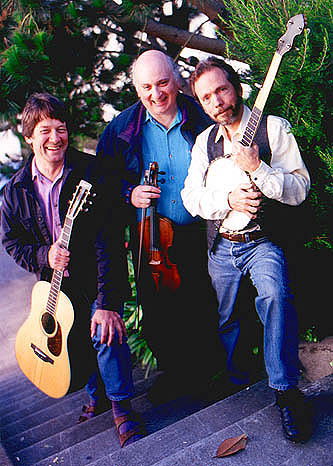
Only a few hours after arriving we attempted a soundcheck in preparation for our first show, in the sweltering heat and humidity of the Beijing afternoon. The tech guy hadn't so much as a trace of knowledge of how a mixing board and mics worked (but at least he was ill-tempered), so we stepped in and got it running, hoping with all our heart that what we were doing would enable us to be heard adequately in the audience. A few folks with ears assured us it would do, so we launched into our first set, and it went quite well, considering. On one of our breaks at this opening evening's festivities, a fashion show was staged, with full runway, deafening disco music, big spotlights, lots of dumbstruck Chinese businessmen ogling dozens of extremely thin, dangerous-looking six-foot-three Chinese women modeling mink garments from (you guessed it) America: purple mink bikinis, tiger-stripe lime green mink hiphuggers, jeans-styled jackets in mink dyed to resemble cheetah. Blue mink boas. The perfect attire for a Great American Barbecue, especially when the temperature is in the nineties with humidity to match. Welcome to the Peoples Republic of China! By the time we finished our last set for the evening, around 11 PM Beijing time, it was midday of the next day in our dog-tired California brains. We had, at this point, been awake (more or less) and in motion for a very long time—the 12 hour flight, plus the wakened hours of the California day (and night) before we departed, plus the time since we'd landed. Not a stellar opening night, but we made it, and folks seemed real pleased. Subsequent nights had the same schedule, alas without the mink queens, but still with Johnson, the spectacularly incompetent sound man. The drill: first set at 7:30, play as we deem appropriate until 10 PM or so, depending on how the crowd feels. Each night was different - sometimes we were background ambiance, sometimes people were really listening. Sometimes the crowd was really large, sometimes small. 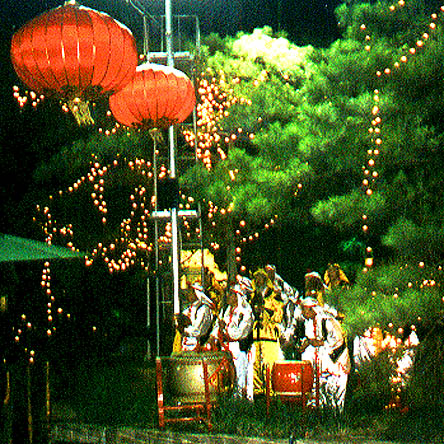
Music is a service industry! So who was there to listen to this peculiar
cultural exchange? Assorted denizens of the hotel, some
of whom were there
for the ag fair, some just there on other business.
Whether on slow or
busy nights, the crowd was usually about half Chinese,
but we detected
eastern Europeans, Germans, Russians, Africans, and a
few Americans.
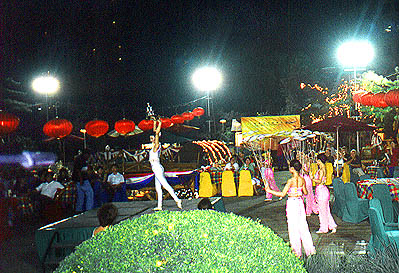
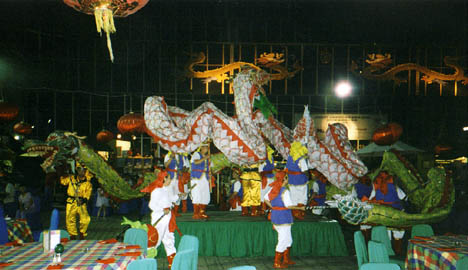 These varied musical menus revealed and increased themselves nightly, to our great delight. Although Heath and I sang some songs, Jody did most of the singing, with Heath and I croaking away on the choruses. The situation was relaxed enough that we generally got onstage each time and just enjoyed ourselves and the little adventures we were generating out of our collective repertoires. Happily, it seemed to work well for our audiences too. Of course we were delighted to play our music for the folks there, but we were just as enthused to see what we could find out about life in China. This turned out to be much easier and much more rewarding than we had imagined. Our professional obligations seemed clear enough, so from breakfast until downbeat at 7:30 in the evening, we had about 12 hours each day to explore. And explore we did, indefatigably and enthusiastically. Part of the reason for the makeup of this band was the shared enthusiasm for travel and new experiences. Oh yes, and food. The Blue Mountain Ramblers do like to eat. 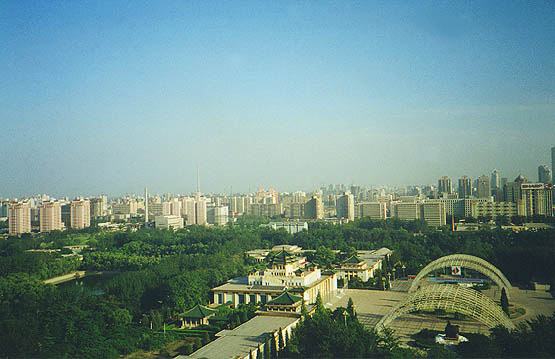
This was one of the more curious pieces of statuary we
saw there - it
was on the grounds of the hotel, around behind the red
temple where we
took the band shots. It looked Thirties or Forties - but
what was
it?
Here's a postcard of the hotel where we stayed and
played. Between the
little temple, a relic of the original palace grounds,
and the hotel itself
was a huge pond and decks where the tables were laid out
for the Great
American Barbecue each night. The killer restaurant was
way up top. We
had breakfast every day at the Silk Road Trattoria, and
ate one large and
sumptuous meal at the Chinese restaurant on the
mezzanine, as guests of
the management (read Jody's wonderful account of our
trip in Fiddler magazine
for details on that!). Also in the hotel was a French
bistro we never even
went into. There is something to be said for having a
refuge like this
in a place like Beijing. Air conditioning, showers, and
good coffee, among
other things.
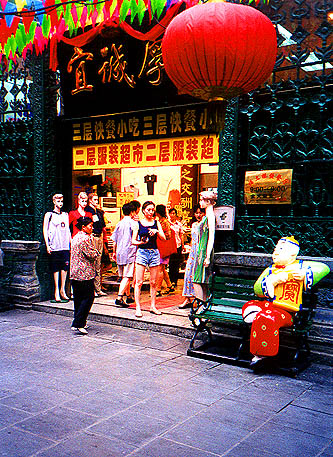 One of my abiding impressions about being in Beijing was feeling completely safe and comfortable, even though we were such obvious outsiders. When you smile at someone, they invariably smile right back. They are eager to try out whatever level of English they have on you, just for the pleasure of communicating. Even the teenagers who were shilling for art galleries were a delight to just hang out with. Yes, they wanted us to come to their gallery and buy something (which we did), but they were happy to spend several hours wandering around, helping us find things, translating things, escorting us on mundane little errands like finding reading specs and batteries. Their generosity and warmth were sincere. We even met people who just wanted a chance to hang out and speak English. No commercial agenda. Never did we encounter so much as a sideways glance, much less any hostility.
Last I'd heard, everyone in Beijing rode
a bike, but alas, not so much anymore. There were still
lots of bikes in
broad bike lanes, serenely floating along, but the roads
and freeways were
swarming with new Volvos, VW Santanas, Buicks (they make
them in China),
Dodge Caravans, Toyotas, Hondas and Jeep Cherokees, BMWs
and Mercedes,
apace with throngs of propane-powered Xialis, most of
which were red, and
were taxis. We'd get to know those red jobs well by the
time we left.
 
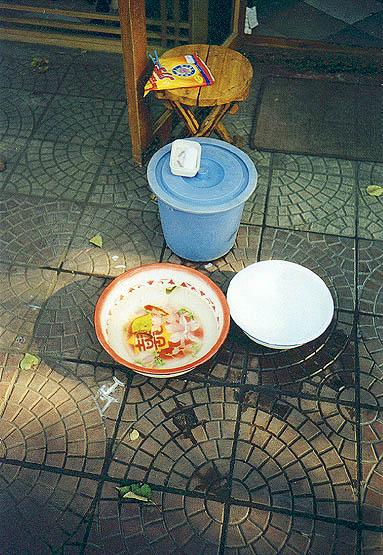 Here is a scene Jody discovered on an afternoon ramble
in the neighborhood
around the corner from our hotel. Some shop keeper
decided to enliven the
sidewalk in front of his shop with a goldfish in a
simple enameled bowl.
There it was, this shimmering little carp, a subtle and
poignant touch
in such a place as this.
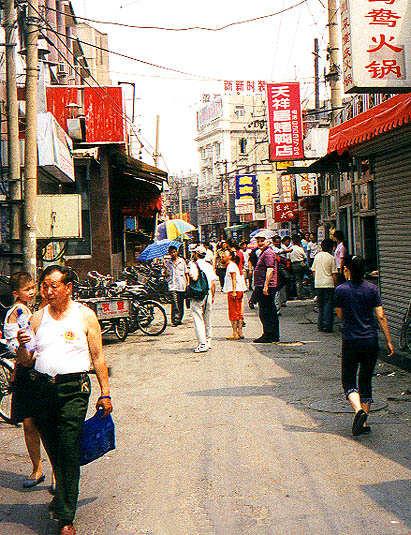
Realizing that some of our new acquaintances in Beijing intended to take us off to their favorite spots, we resolved to spend some of our time exploring neighborhoods and visiting tourist spots, and had very little agenda, other than hoping to find a good music store and some good food. One of travel's greatest pleasures is just wandering until something happens. Morning number one commenced with a trip to an alleged music store, a good enough pretext for getting out into the thick of things. Card in hand, we hailed a cab for a neighborhood south of Tienanmen Square said to harbor the music shop. On arriving, we were almost immediately accosted by two earnest young people, a lad named Cawley (who played the guitar) and a very tiny, energetically chipper girl named Amber, who were each just graduating from high school in different towns out in the provinces. It quickly became clear that, though they had ulterior motives, they had good hearts and really just enjoyed tagging along with us, practicing their English, showing us things, explaining and translating, helping us find the music store (we found two, each rather underwhelming), and grilling us as well.
Finally they asked if we'd like to come visit
the art gallery they worked for, to view some
traditional Chinese art.
We said sure, why not, and clambered up a couple of
flights of stairs in
the back of a cellphone store. The gallery had quite a
selection of original
art by a number of artists, some quite good, others less
inspired. We did,
in fact, buy some pieces.
 My particular prize was a large scroll painting
of a young Chinese woman, kneeling in repose, holding an
apple, an enigmatic
and serious air about her. The composition was quite
traditional, so far.
The face riveted both Jody and I particularly, and then
we all saw the
quirk: a sneakered foot. Jody astutely observed that the
painting was like
the music we played: old and new at the same time.
We didn't find the good music store until days later, though we got a superb introduction to China, just wandering the streets and watching people go about their business. 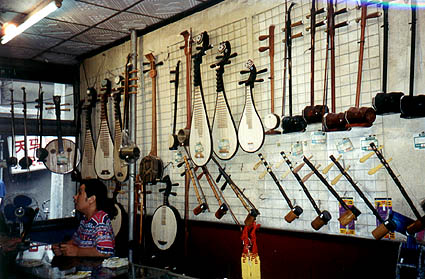
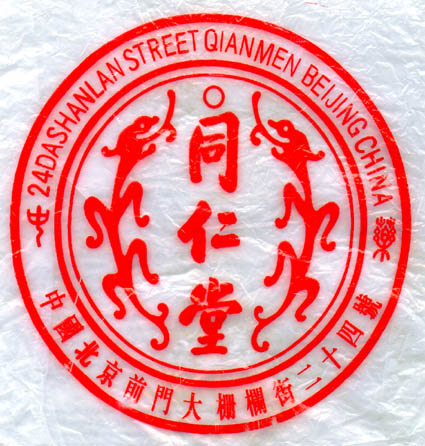 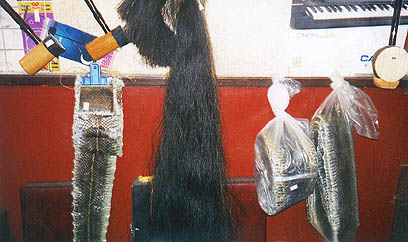 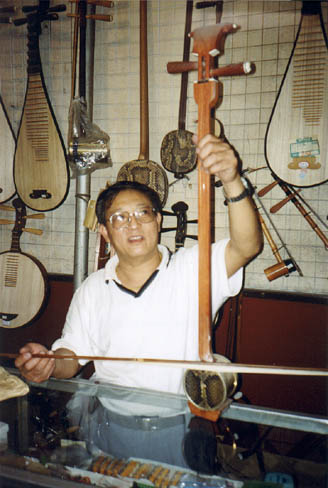
This fearsome thing is called "Drunken Man Howling,"
and when we got
a demo from the shopkeeper, we understood why!
The Forbidden City Day Two took us to the old walled imperial
palace, called the Forbidden City. The Chinese monarchy
ended in 1911,
and it has since become an enormous park that includes
all the old buildings
and grounds, temples, shops, museums and gardens.
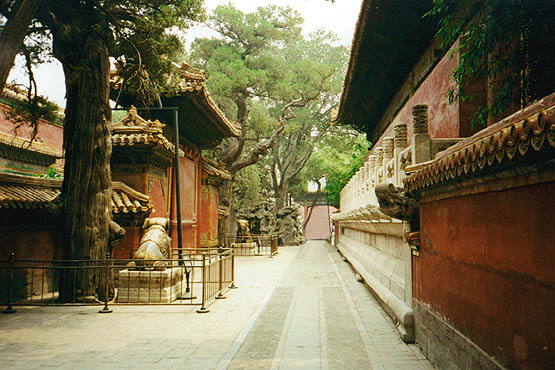 If you've seen the recent film Crouching Tiger
Hidden Dragon
(I liked it a lot), you have glimpsed the Forbidden
City. The whole "Peking"
segment, including those flying-over-the-roof nighttime
scenes, were shot
there. The place is absolutely vast. Since we were
there, someone told
me there is a Starbucks inside the Forbidden City. Glad
I didn't see it.
This place was red long before Mao
Zedong and Zhou Enlai.
We were admittedly tourists, but what we
didn't quite comprehend in advance was being such a
minority amidst so
many other tourists, basically all of them Chinese. As
Americans flock
to Washington DC to see the sights, so do the Chinese
throng to Beijing,
once in their lives anyway, to experience a bit of their
own cultural history.
And as wonderful as it was for me to see the splendors
of the ancient dynasties
that were responsible for the Forbidden City, I got the
greatest pleasure
out of watching the Chinese families drifting through
the place around
us as they laughed and took snapshots of one another,
chatted, shared picnic
lunches. Observing how they simply behaved with one
another revealed a
great deal.
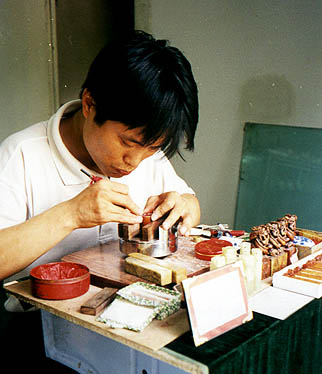
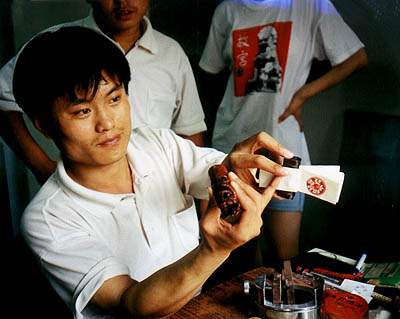
Each day had one major adventure and several minor ones. The next page starts with an account of our visit to the Summer Palace, and goes on to the Great Wall, the Temple of Heaven, and much more.
Want to keep going? Very good! Click here to go to page
two or page three or
even page
four
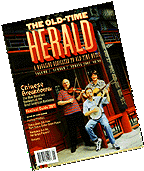
This site began as a practice version of an article I wrote for The Old Time Herald, and that article has been published. Be sure and read this fine magazine,
which you can access
by visiting their website at http://www.oldtimeherald.org
Click here to
read Jody Stecher's
different and quite wonderful article which he wrote
for Fiddler Magazine This little scrapbook is a work in
progress. More pictures
are bound to come, and more jabber to go with them.
Check in again.
last fooled with on 25 February 2001 |
